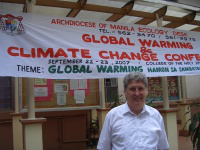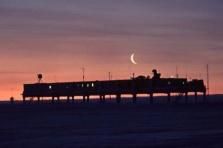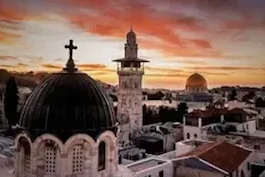Columban Fr Sean McDonagh reports from UN Climate Conference

Fr Sean McDonagh
The UN Framework Conference on Climate Change began on 28 November, in Durban, South Africa. Almost 10,000 people, including representatives from governments, international organisations and civil society are taking part. The discussions will seek to advance, in a balanced fashion, the implementation of the Convention and the Kyoto Protocol, as well as the Cancun Agreements, reached at COP 16 last December.
The Conference was opened by the President of the Republic of South Africa, Jacob Zuma. He called on all parties involved in the negotiations to work diligently to find a solution to the climate issues at Durban. According to President Zuma: "For most people in the developing world and Africa, climate change is a matter of life and death. We are always reminded by the leaders of small island nations that climate change threatens their very existence." He went on to say that, "recently the island national of Kiribati became the first country to declare that global warming is rendering its territory uninhabitable and they asked for help to evacuate the population".
But the devastation climate change will bring will not be confined to small island nations or coastal cities in other countries. President Zuma claimed that climate change will reduce agriculture output by 50 percent across the African continent. He drew attention to the fact that, "severe drought in Somalia is exacerbating an already volatile region causing displacement of populations and increasing refugee communities in Kenya". If one includes that a high level of population growth is predicted for Africa alongside falling food production, then the future will be very problematic unless significant action is taken on climate change. In South Africa itself, climate change has led to severe flooding in coastal areas. As a result some people have lost their lives and others have lost their livelihoods.
The impact of climate change is not confined to small island nations or the continent of Africa. President Zuma said that, "in the Americas, we have also witnessed the frequency of intense hurricanes on the Gulf Coast from which the communities of New Orleans have yet to fully recover, five years after Hurricane Katrina". In some quarters the climate change debate is often divorced from eradicating global poverty. The location of the conference in Africa should be a reminder to the delegates, said President Zuma, "that solving climate change cannot be separated from eradicating poverty".
He went on to recall the progress made to date. At COP 15 in Copenhagen in 2009, there was a commitment to reduce carbon dioxide emissions by 34 percent by 2020 and 42 percent by 2025. Reductions of this scale are essential if the average global temperature is to be kept below a 2 degree Celsius rise. The study released by the Pontifical Academy of the Sciences earlier this year entitled The Fate of Mountain Glaciers in the Anthropocene called the 2 degrees increase the 'guard rail,' though the scientists involved would prefer if the average increase was kept bellow 1.5 degree Celsius rather than 2 degrees.
At COP 16 in Cancun, Mexico, this time last year, the parties agreed to reduce carbon dioxide emissions but no number or time line was specified. This is very worrying because a study by the United Nations Environment Programme (UNEP) found that the pledges made by the Parties in Cancun are insufficient to realise the goal of the Convention. These pledges are not enough to stabilise greenhouse gas concentrations in the atmosphere at the level that would prevent dangerous anthropogenic interference with the climate systems. Under a business-as-usual scenario - which is likely if there is no binding agreement at Durban - carbon emissions could reach 56 gigatonnes of carbon which would create havoc in many parts of the world.
The stakes for the future of hundreds of millions of people and vital ecosystems are very high at Durban. Towards the end of his address President Zuma reflected that, given the urgency at stake, parties should strive to find solutions here in Durban - "You must work towards an outcome that is balanced, fair and credible".
Source: Columbans
















